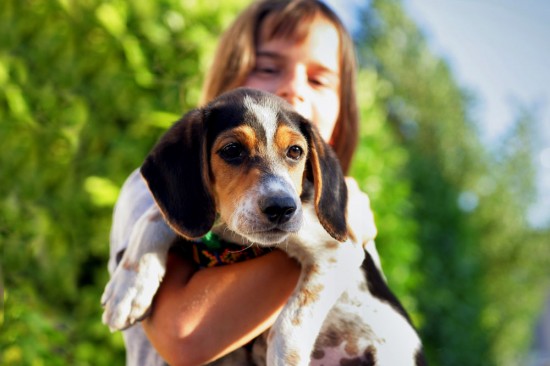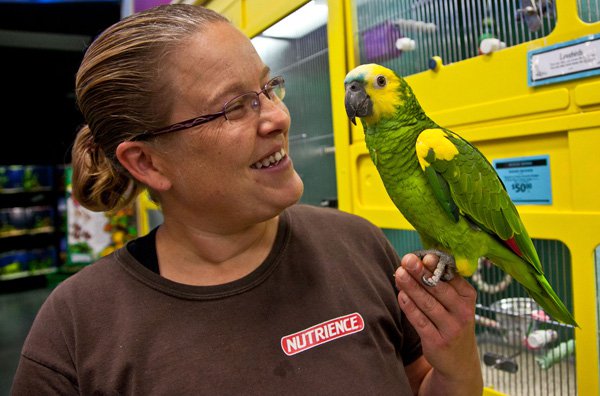

Children that are raised with animals of any kind, particularly if they are actively encouraged to play a part in the care and day to day maintenance of their pet, tend to grow up into well rounded, empathic adults with a lifelong respect for and love of animals. But there are a great many other benefits and life lessons that children learn can from animals aside from the obvious, that should not be understated in terms of the positive effects that they can have upon young people and the important skills that animals can help your child to learn.
Are you wondering what having a pet can teach your child? Read on to find out more!
Helping with the care and day-to-day welfare of your pet introduces children at a young age to the concept of responsibility. ‘Can I have a pet?’ to your child, often means that they think it might be nice to have something to play with, or that the cute-appeal of a puppy or kitten has caught their eye. But the reality of actually owning a pet, and having to take care of their day to day needs such as feeding and exercise, and the fact that pet ownership is not all fun and games, is something that often passes children by. If your child is clamouring to be allowed to have an animal, its important to teach them beforehand that owning a pet is a big commitment, and that a pet is not a toy that can be discarded or neglected when something better comes along. Involving your child in the day-to-day care of your pet gives them a direct and important lesson in responsibility, and teaches them that their actions and behaviour directly impact upon another creature.
Looking after an animal and taking care of their needs gives your child the opportunity to see how their behaviour and the things they do affect your pet, and vice versa. Giving and receiving affection, being able to identify when your pet isn’t feeling happy or well, and learning about the signals they give off that indicate excitement, happiness, fear or annoyance, are all really valuable stages in your child’s development that can be greatly enhanced by interaction with a much loved pet.
Training an animal, gaining its trust and knowing when to stop for the day are all skills that can help your child to develop their understanding of respect and patience. Knowing when your pet has had enough and no longer wants to play, is sleeping and wishes to be left alone, or is not enjoying something that they are doing, are all skills that interacting with an animal of any kind can help to develop.
In time, your child will learn to read the cues that your animal gives to them and will come to understand that sometimes, however much they may wish to play or do something with your pet, your pet is not in the mood. Children should always be carefully supervised around pets for their own protection (and that of the animal) but it is also important to teach your child to be able to read your pet’s moods and warning signs for themselves. This helps them to develop a respect for animals and the patience required when dealing with them that your child will be able to transfer over to many other areas of their life as they grow up.
Having an animal around the house offers almost limitless possibilities for teaching your child about biology, anatomy, health and wellness, and even other areas of science such as physics and chemistry if you are so inclined! More or less any aspect of pet care or playing with your pet can become a fun and informal science lesson, from why your pet needs to eat the food they eat, to how your pet moves, why your pet looks like they do, and what happens when your pet is ill. Inspiring your child’s interest in science and satisfying their natural curiosity for animals and the world around them can give them a real head start in school, and form the basis of an enthusiasm for science and learning that will carry through their entire education and into later life.
Finally, to most children who are desperate to own a pet, the idea of playing with their pet and having fun with them is the greatest appeal. Being able to play with and have fun with their animal is the ultimate reward of pet ownership for children, and is what will serve to maintain their interest in their animal and keep them committed to doing the mundane chores required to keep a pet, such as clearing up after them and feeding them.
Keeping a pet offers a limitless range of opportunities for play and games that can all help your child to develop a wide range of skills, at the same time as serving to keep them enthusiastic about animals and having fun.
Having pets around the house or buying a pet specifically for your child after a lot of discussion and research had a great many benefits for your child, as outlined above. But it is important to remember that as the adult and ultimate person responsible for the animal in question, it’s up to you to pick up the slack and be able to take care of your child’s pet if they become unable or unwilling to do so. You should always monitor your child’s interaction with their pet, and not just take it as a given that your child is doing everything that they should be doing without supervision.
Children are constantly growing and developing, and finding their place in the world around them. You might find that as your child gets older, they will lose interest in animals for a time, or that their enthusiasm and love of pets will increases with age.
Understandably, every child will probably go through a phase of not wanting to bother with doing the mundane pet care tasks and will need a push and prompting on occasion to fulfil their commitments regarding caring for your pet. Nevertheless, if your child is adamant that they do not want anything to do with your pet, or show an active dislike of them or even fear, it is important not to push them or force the issue, as this can be counter-productive and have the opposite effect of everything that you are hoping to achieve.
 Maintain the aquarium/fish tanks with utmost ease using the right product
Maintain the aquarium/fish tanks with utmost ease using th
Maintain the aquarium/fish tanks with utmost ease using the right product
Maintain the aquarium/fish tanks with utmost ease using th
 Pet insurance saves lives. Get yours with Cutest Paw
Pet insurance saves lives. Get yours with Cutest Paw
Pet insurance saves lives. Get yours with Cutest Paw
Pet insurance saves lives. Get yours with Cutest Paw
 Five Canine Crises That Mean Your Dog Must See The Vet
Five Canine Crise
Five Canine Crises That Mean Your Dog Must See The Vet
Five Canine Crise
 Why Worming Your Dog Is So Important
Why Worming Your
Why Worming Your Dog Is So Important
Why Worming Your
 Why I Make Dog Food
He was the skinniest puppy I had ever seen. The shelter
Why I Make Dog Food
He was the skinniest puppy I had ever seen. The shelter
Copyright © 2005-2016 Pet Information All Rights Reserved
Contact us: www162date@outlook.com